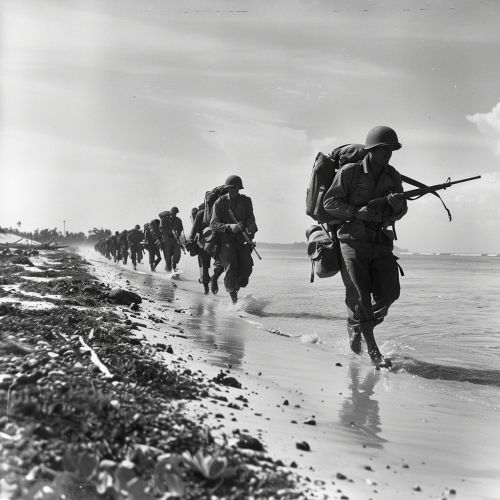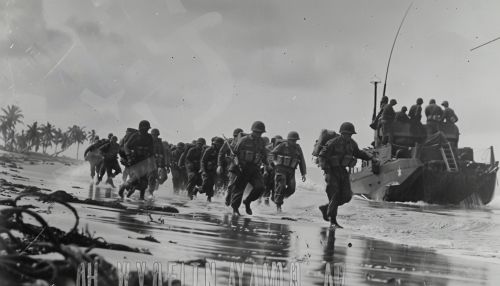Alexander Vandegrift
Early Life and Education
Alexander Archer Vandegrift was born on March 13, 1887, in Charlottesville, Virginia. He was the son of William E. Vandegrift and Virginia Vandegrift. His early education took place in local schools, where he demonstrated a keen interest in military history and tactics. This interest led him to pursue a career in the military, and he subsequently attended the University of Virginia before entering the United States Marine Corps in 1909.
Military Career
Early Service
Vandegrift's initial assignments included service in the Caribbean, where he participated in the occupation of Nicaragua and the Dominican Republic. His early career was marked by his involvement in the so-called "Banana Wars," a series of military interventions by the United States in Central America and the Caribbean. These experiences provided him with valuable combat and leadership skills that would serve him well in later conflicts.
World War I
During World War I, Vandegrift served with the 5th Marine Regiment in France. He participated in several key battles, including the Battle of Belleau Wood, which was a defining moment for the United States Marine Corps. His leadership and bravery earned him the Navy Cross, one of the highest decorations for valor.
Interwar Period
In the years between the World Wars, Vandegrift continued to rise through the ranks of the Marine Corps. He held various staff and command positions, including a stint as an instructor at the Marine Corps Schools in Quantico, Virginia. His expertise in amphibious warfare began to take shape during this period, as he studied and developed tactics that would later be crucial in the Pacific Theater.
World War II
Guadalcanal Campaign
One of Vandegrift's most significant contributions came during World War II, particularly in the Guadalcanal Campaign. As the commanding general of the 1st Marine Division, he led the first major offensive against Japanese forces. The Battle of Guadalcanal was a pivotal moment in the Pacific War, marking the first significant strategic victory for Allied forces against Japan.


Vandegrift's leadership during the campaign was instrumental in securing the island, despite facing severe logistical challenges and fierce resistance from Japanese forces. His ability to maintain morale and effectiveness under such conditions earned him the Medal of Honor.
Later War Years
Following the success at Guadalcanal, Vandegrift was promoted to lieutenant general and took on more strategic roles within the Marine Corps. He played a key part in planning and executing subsequent operations in the Pacific, including the battles of Tarawa, Saipan, and Iwo Jima. His strategic acumen and understanding of amphibious warfare were critical to the success of these campaigns.
Post-War Career
Commandant of the Marine Corps
In 1944, Vandegrift became the 18th Commandant of the Marine Corps, a position he held until 1947. During his tenure, he focused on post-war reorganization and modernization of the Marine Corps. He advocated for the importance of maintaining a strong and independent Marine Corps, which led to the passage of the National Security Act of 1947. This act established the Marine Corps as a separate branch of the United States Armed Forces, ensuring its continued existence and relevance.
Retirement and Legacy
After retiring from active duty in 1947, Vandegrift remained active in military and veteran affairs. He wrote extensively on military strategy and the history of the Marine Corps. His contributions to military thought and his leadership during some of the most critical battles of World War II have left an enduring legacy.
Awards and Honors
Vandegrift received numerous awards and decorations throughout his career, including the Medal of Honor, the Navy Cross, and the Distinguished Service Medal. His international recognitions included honors from allied nations, reflecting his significant contributions to the Allied war effort.
Personal Life
Vandegrift married Mildred Strode in 1909, and the couple had one son, Alexander Vandegrift Jr., who also pursued a career in the Marine Corps. Vandegrift's personal interests included history and writing, and he spent much of his retirement years documenting his experiences and insights.
